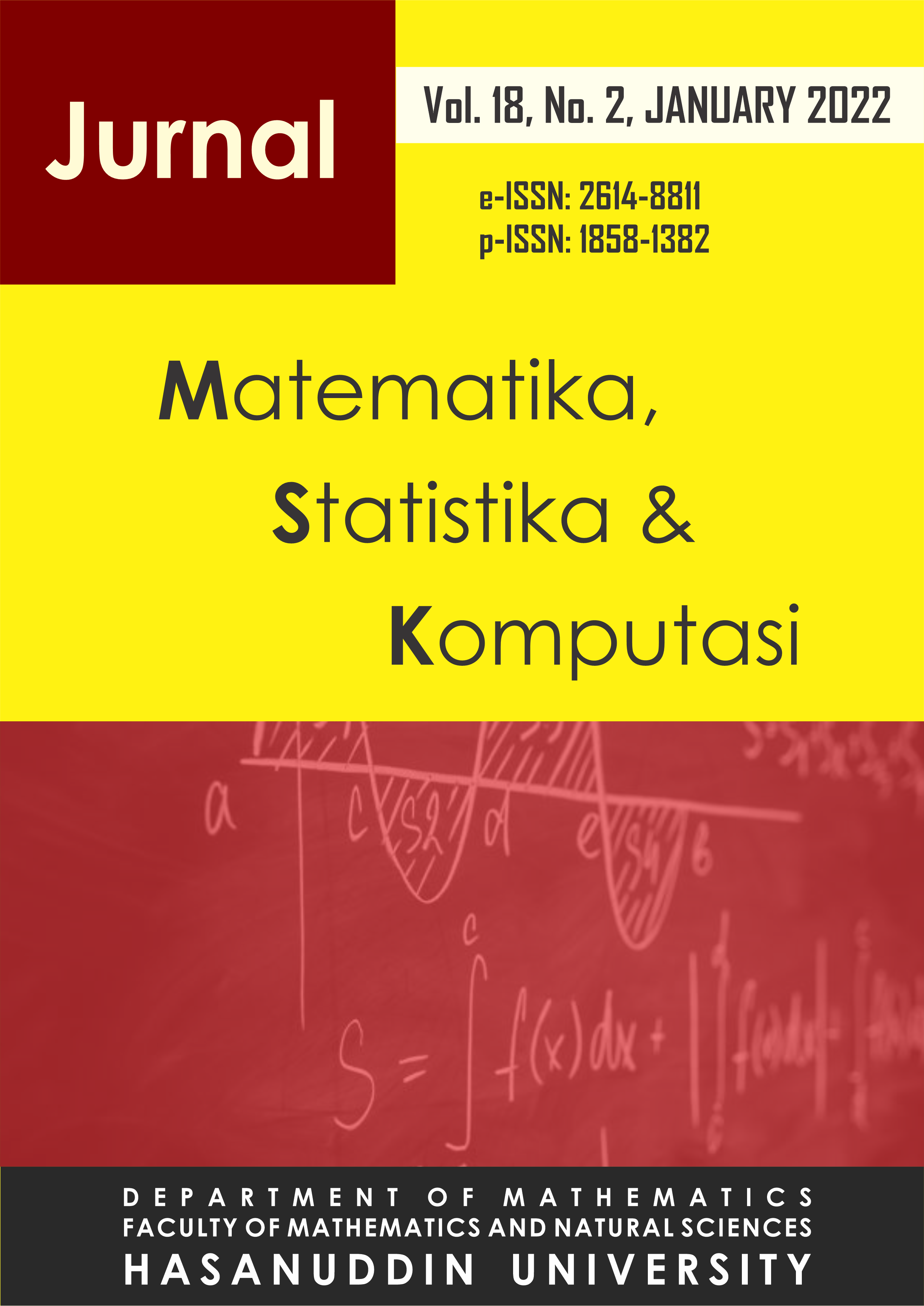Forecasting the Existence of Chocolate with Variation and Seasonal Calendar Effects Using the Classic Time Series Approach
DOI:
https://doi.org/10.20956/j.v18i2.18542Keywords:
Chocolate, Calender Varians, Seasonal, MAPEAbstract
Chocolate is the raw material for making cakes, so consumption of chocolate also increases on Eid al-Fitr. However, this is different in the United States where the tradition of sharing chocolate cake is carried out on Christmas. To monitor the existence of this chocolate can be through the movement of data on Google Trends. This study aims to predict the existence of chocolate from the Google trend where the use of chocolate by the community fluctuates according to the calendar variance and seasonal rhythm. The method used is classic time series, namely nave, double exponential smoothing, multiplicative decomposition, addictive decomposition, holt winter multiplicative, holt winter addictive, time series regression, hybrid time series, ARIMA, and ARIMAX. Based on MAPE in sample, the best time series model to model the existence of chocolate in Indonesia is ARIMAX (1,0,0) while for the United States it is Hybrid Time Series Regression-ARIMA(2,1,[10]). For forecasting the existence of chocolate in Indonesia, the best models in forecasting are ARIMA (([11],[12]),1,1) and Naïve Seasonal. In contrast to the best forecasting model for the existence of chocolate in the United States, namely Hybrid Naïve Seasonal-SARIMA (2,1,0)(0,0,1)12 Hybrid Time Series Regression- ARIMA(2,1,[10]), Time Series Regression, Winter Multiplicative, ARIMAX([3],0,0).
References
. Chrisdayanti, B., 2015. Peramalan kandungan Particulate Matter (PM10) dalam udara ambien kota Surabaya menggunakan Double Seasonal ARIMA (DSARIMA) (Doctoral dissertation, Institut Teknologi Sepuluh Nopember).
. Cryer, J. D., & Chan, K. S., 2008. Time series analysis: with applications in R (Vol. 2). New York: Springer.
. Halim, J. F., 2016. Implementasi Konsep Addiction in Catchiness pada Perancangan Interior “Rumah Cokelat” di Surabaya. Intra, 4(2), 339-351.
. Hanim, Y. M., 2015. Penerapan Regresi Time Series dan ARIMAX untuk Peramalan Inflow dan Outflow Uang Kartal di Jawa Timur, DKI Jakarta dan Nasional (Doctoral dissertation, Institut Teknology Sepuluh Nopember).
. Huang, M. Y., Rojas, R. R., & Convery, P. D., 2020. Forecasting stock market movements using google trend searches. Empirical Economics, 59(6), 2821-2839.
. Jun, S. P., Yoo, H. S., & Choi, S., 2018. Ten years of research change using Google Trends: From the perspective of big data utilizations and applications. Technological forecasting and social change, 130, 69-87.
. Lim, S., Tanudjaja, B. B., & Salamoon, D. K., 2015. Perancangan Kemasan Produk" Choco Molten” Online Bakery Instacake Sebagai Media Promosi. Jurnal DKV Adiwarna, 1(6), 12.
Lorie, M., & Hagen, E. 2007. Predicting refill of the Patuxent and Occoquan reservoirs: A new iterative tool based on ARIMA. ICPRB Rep, 07-4.
. Makridakis, S., Wheelwright, S. C., & McGee, V. E., 2003. Metode dan Aplikasi Peramalan, Jilid 1 Edisi Revisi (terj.). Binarupa Aksara. Jakarta.
. Mun, M. K., & Chong, C. W., 2018. Forecasting movie demand using total and split exponential smoothing. Jurnal Ekonomi Malaysia, 52(2), 81-94.
. Rosalina, E., Sugiarto,S. and Gamal, M. D. H., 2018.Metode Peramalan Holt-Winter untuk MemprediksiJumlah Pengunjung Perpustakaan Universitas Riau. Riau: Universitas Riau.
. Sadew, E. 2013. Perbandingan Beberapa Metode Time Series pada Peramalan Jumlah Kunjungan Wisatawan Mancanegara: Studi Kasus di Kabupaten Karimun, Provinsi Kepulauan Riau. Researchgate DOI, 10.
. Wirawan, I. G. P. N., & Utama, M. S., 2014. Model Box-Jenkins dalam Rangka Peramalan Produk Domestik Regional Bruto Provinsi Bali. Buletin Studi Ekonomi, 44257.
. Yuni, S., Talakua, M. W., & Lesnussa, Y. A., 2015. Peramalan Jumlah Pengunjung Perpustakaan Universitas Pattimura Ambon Menggunakan Metode Dekomposisi. BAREKENG: Jurnal Ilmu Matematika dan Terapan, 9(1), 41-50.
. Zhang, G. P., 2003. Time series forecasting using a hybrid ARIMA and neural network model. Neurocomputing, 50, 159-175.
Downloads
Published
How to Cite
Issue
Section
License
Copyright (c) 2021 Author and publisher

This work is licensed under a Creative Commons Attribution 4.0 International License.

This work is licensed under a Creative Commons Attribution 4.0 International License.
Jurnal Matematika, Statistika dan Komputasi is an Open Access journal, all articles are distributed under the terms of the Creative Commons Attribution License, allowing third parties to copy and redistribute the material in any medium or format, transform, and build upon the material, provided the original work is properly cited and states its license. This license allows authors and readers to use all articles, data sets, graphics and appendices in data mining applications, search engines, web sites, blogs and other platforms by providing appropriate reference.







